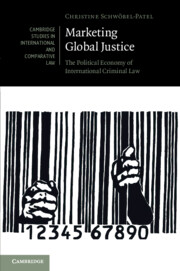Book contents
- Marketing Global Justice
- Cambridge Studies in International and Comparative Law: 152
- Marketing Global Justice
- Copyright page
- Contents
- Figures
- Acknowledgements
- 1 Introduction
- 2 Ad-Vocacy
- 3 A Brand New Justice
- 4 ‘A Picture Worth More Than a Thousand Words’
- 5 ‘Working It’
- 6 Kony 2012
- 7 Special Effects
- 8 Branding the Global (In)Justice Place
- 9 ‘Occupying’ Global Justice
- 10 Conclusion
- Select Bibliography
- Index
- Cambridge Studies in International and Comparative Law: 152
10 - Conclusion
Published online by Cambridge University Press: 22 March 2021
- Marketing Global Justice
- Cambridge Studies in International and Comparative Law: 152
- Marketing Global Justice
- Copyright page
- Contents
- Figures
- Acknowledgements
- 1 Introduction
- 2 Ad-Vocacy
- 3 A Brand New Justice
- 4 ‘A Picture Worth More Than a Thousand Words’
- 5 ‘Working It’
- 6 Kony 2012
- 7 Special Effects
- 8 Branding the Global (In)Justice Place
- 9 ‘Occupying’ Global Justice
- 10 Conclusion
- Select Bibliography
- Index
- Cambridge Studies in International and Comparative Law: 152
Summary
Recent literature on international law, neoliberalism, and empire has highlighted the profoundly de-politicising and de-historicising effects of universalising projects that emerged from Western notions of superiority and were forced onto the non-Western world. In this book, I have sought to contribute to this conversation by analysing the hegemonic understanding and institutionalisation of global justice as defined by international criminal law (ICL). I have particularly been interested in how ICL has gained such traction as a global justice project. To get to the question of how?, I introduced a so far under-researched, but crucially important mechanism: marketing. As one of capitalism’s vital means of persuasion, distraction, and renewal, the alliance between marketing and ICL has narrowed and normalised a marketised idea of global justice. Mostly, this has evaded sustained scrutiny because of the normalisation of marketised language and practices. Contrary to common views on marketing being either benign or positive, I have shown that marketing has a deeply structuring effect on global justice. In its alliance with ICL, it has de-politicised and de-historicised global justice, thereby draining it of its radical potential. The effects of a de-politicised and de-historicised global justice are wide-reaching: The narrow version of global justice as concerning predominantly anti-impunity has adopted a crucial position for enabling and encasing the market, distracting from structural inequalities, and disabling or marginalising democratic contestation. Potential political action is reframed as consumption, whether this is the support for certain non-governmental organisation campaigns or the identity forged through allegiance with a particular place. This is marketing global justice as mass distraction. The focus on market values over social values explains the lack of redistributive functions for global justice.
- Type
- Chapter
- Information
- Marketing Global JusticeThe Political Economy of International Criminal Law, pp. 269 - 273Publisher: Cambridge University PressPrint publication year: 2021

